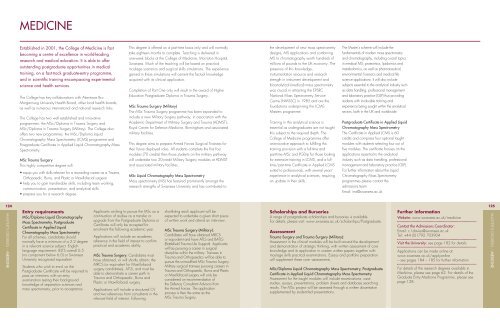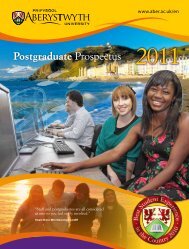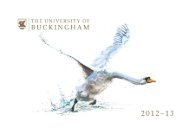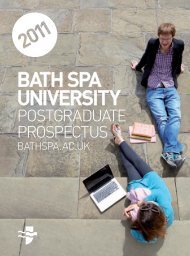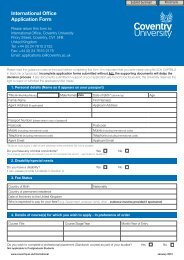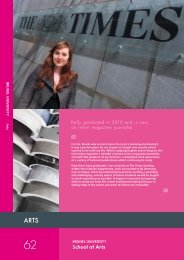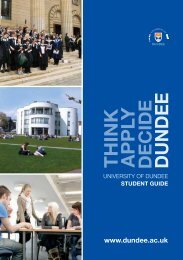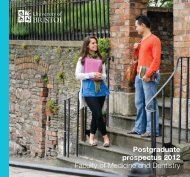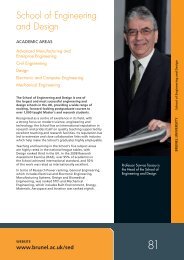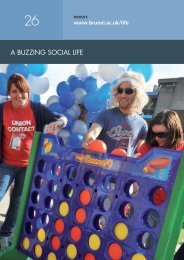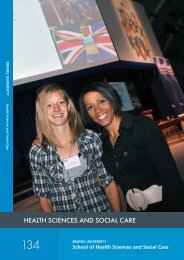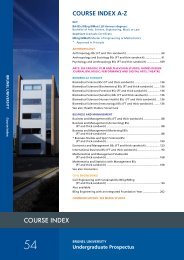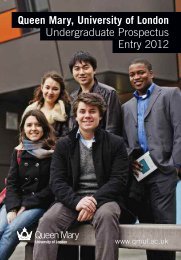www.swansea.ac.uk Postgraduate Prospectus 2012
www.swansea.ac.uk Postgraduate Prospectus 2012
www.swansea.ac.uk Postgraduate Prospectus 2012
- No tags were found...
Create successful ePaper yourself
Turn your PDF publications into a flip-book with our unique Google optimized e-Paper software.
MEDICINEEstablished in 2001, the College of Medicine is fastbecoming a centre of excellence in world-leadingresearch and medical education. It is able to offeroutstanding postgraduate opportunities in medicaltraining, on a fast-tr<strong>ac</strong>k graduate-entry programme,and in scientific training encompassing experimentalscience and health services.The College has key collaborations with Abertawe BroMorgannwg University Health Board, other local health boards,as well as numerous international and national research links.The College has two well established and innovativeprogrammes: the MSc/Diploma in Trauma Surgery andMSc/Diploma in Trauma Surgery (Military). The College alsooffers two new programmes: the MSc/Diploma LiquidChromatography Mass Spectrometry (LCMS) programme and<strong>Postgraduate</strong> Certificate in Applied Liquid Chromatography MassSpectrometry.MSc Trauma SurgeryThis highly competitive degree will:• equip you with skills relevant for a rewarding career as a Trauma,Orthopaedic, Burns, and Plastic or Maxillof<strong>ac</strong>ial surgeon• help you to gain transferable skills, including team working,communication, presentation, and analytical skills• prepare you for a research degree.This degree is offered on a part-time basis only and will normallytake eighteen months to complete. Te<strong>ac</strong>hing is delivered inone-week blocks at the College of Medicine, Morriston Hospital,Swansea. Much of the te<strong>ac</strong>hing will be based on pr<strong>ac</strong>ticalmoulage scenarios and surgical skills simulations. The experiencegained in these simulations will cement the f<strong>ac</strong>tual knowledge<strong>ac</strong>quired with its clinical application.Completion of Part One only will result in the award of HigherEducation <strong>Postgraduate</strong> Diploma in Trauma Surgery.MSc Trauma Surgery (Military)The MSc Trauma Surgery programme has been expanded toinclude a new Military Surgery pathway, in association with theAcademic Department of Military Surgery and Trauma (ADMST),Royal Centre for Defence Medicine, Birmingham and associatedmilitary f<strong>ac</strong>ilities.This degree aims to prepare Armed Forces Surgical Trainees fortheir future deployed roles. All students complete the first fourmodules (70 credits) then those students on the military pathwaywill undertake two 20-credit Military Surgery modules at ADMSTand associated military f<strong>ac</strong>ilities.MSc Liquid Chromatography Mass SpectrometryMass spectrometry (MS) has featured prominently amongst theresearch strengths of Swansea University and has contributed tothe development of new mass spectrometrydesigns, MS applications and combiningMS to chromatography worth hundreds ofmillions of pounds to the UK economy. Thepresence of this knowledge,instrumentation resource and researchstrength in instrument development andbioanalytical (medical) mass spectrometrywas crucial in attr<strong>ac</strong>ting the EPSRCNational Mass Spectrometry ServiceCentre (NMSSC) in 1985 and are thefoundations underpinning the LCMSMasters programme.Training in this analytical science isessential as undergraduates are not taughtthis subject to the required depth. TheCollege of Medicine programmes offeraninnovative appro<strong>ac</strong>h to fulfilling thistraining provision with a full-time andpart-time MSc and PGDip for those lookingfor extensive training in LCMS, and a fulltime/part-timeCertificate in Applied LCMSsuited to professionals, with several years’experience in analytical sciences, requiringan up-date in their skills.The Master’s scheme will include thefundamentals of modern mass spectrometryand chromatography, including crucial topicsin medical MS; proteomics, lipidomics andmetabolomics, as well as pharm<strong>ac</strong>eutical,environmental, forensics and medical lifescience applications. It will also includesubjects essential to the analytical industry suchas data handling, professional managementand laboratory pr<strong>ac</strong>tice (GLP) thus providingstudents with invaluable training andexperience being sought within the analyticalsectors, both in the UK and worldwide.<strong>Postgraduate</strong> Certificate in Applied LiquidChromatography Mass SpectrometryThe Certificate in Applied LCMS is 60credits and comprises four optional taughtmodules with students selecting four out offive modules. The certificate focuses on theapplications essential to the analyticalindustry such as data handling, professionalmanagement and laboratory pr<strong>ac</strong>tice (GLP).For further information about the LiquidChromatography Mass Spectrometryprogrammes please cont<strong>ac</strong>t theadmissions teamEmail: ims@<strong>swansea</strong>.<strong>ac</strong>.<strong>uk</strong>124125MASTER'S DEGREES – MEDICINEEntry requirementsMSc/Diploma Liquid ChromatographyMass Spectrometry, <strong>Postgraduate</strong>Certificate in Applied LiquidChromatography Mass SpectrometryFor all schemes, candidates shouldnormally have a minimum of a 2.2 degreein a relevant science subject. Englishlanguage requirement: IELTS overall 6.5(no component below 6.0) or SwanseaUniversity recognised equivalent.Students who wish to enrol on the<strong>Postgraduate</strong> Certificate will be required topass an interview with an entryexamination testing their b<strong>ac</strong>kgroundknowledge of separation sciences andmass spectrometry, prior to <strong>ac</strong>ceptance.Applicants wishing to pursue the MSc as <strong>ac</strong>ontinuation of studies as a transfer orupgrade from the <strong>Postgraduate</strong> Diploma orCertificate will only be <strong>ac</strong>cepted forenrolment the following <strong>ac</strong>ademic year.Applications will include an <strong>ac</strong>ademicreference in the field of interest to confirmpr<strong>ac</strong>tical and <strong>ac</strong>ademic ability.MSc Trauma Surgery: Candidates musthave obtained, or will shortly obtain; theMRCS (or equivalent for Maxillof<strong>ac</strong>ialsurgery candidates), ATLS, and must beable to demonstrate a career path inTrauma and Orthopaedic, Burns andPlastic or Maxillof<strong>ac</strong>ial surgery.Applications will include a structured CVand two references from consultants in therelevant field of interest. Followingshortlisting e<strong>ac</strong>h applicant will beexpected to undertake a given short pieceof written work and attend an interview.MSc Trauma Surgery (Military):Candidates will have obtained MRCSor equivalent and have ATLS and BATLS(Battlefield Trauma Life Support). Applicantswill be pursuing a career in surgicaldiscipline within the military. Trainees inTrauma and Orthopaedics will be able topursue the unmodified MSc Trauma Surgery.Military surgical trainees pursuing careers inTrauma and Orthopaedic, Burns and Plasticor Maxillof<strong>ac</strong>ial surgery will only beconsidered on recommendation ofthe Defence Consultant Advisors fromthe Armed Forces. The applicationprocess is then the same as theMSc Trauma Surgery.Scholarships and BursariesA range of postgraduate scholarships and bursaries is available.For details, please visit: <strong>www</strong>.<strong>swansea</strong>.<strong>ac</strong>.<strong>uk</strong>/scholarships/<strong>Postgraduate</strong>.AssessmentTrauma Surgery and Trauma Surgery (Military):Assessment in the clinical modules will be built around the developmentand demonstration of strategic thinking, with written assessment of coreknowledge and its application in unseen written papers together withmoulage skills pr<strong>ac</strong>tical examinations. Essays and portfolio preparationwill supplement these core -assessments.MSc/Diploma Liquid Chromatography Mass Spectrometry, <strong>Postgraduate</strong>Certificate in Applied Liquid Chromatography Mass SpectrometryAssessment for the taught modules will include examinations, casestudies, essays, presentations, problem sheets and database searchingresults. The MSc project will be assessed through a written dissertationsupplemented by student-led presentations.Further informationWebsite: <strong>www</strong>.<strong>swansea</strong>.<strong>ac</strong>.<strong>uk</strong>/medicineCont<strong>ac</strong>t the Admissions Coordinator:Email: c.l.davies@<strong>swansea</strong>.<strong>ac</strong>.<strong>uk</strong>Tel: +44 (0)1792 703904Visit the University: see page 182 for detailsApplications can be made online at:<strong>www</strong>.<strong>swansea</strong>.<strong>ac</strong>.<strong>uk</strong>/applyonline– see pages 184 – 185 for further informationFor details of the research degrees available inMedicine, please see page 62. For details of theGraduate Entry Medicine Programme, please seepage 128.MASTER'S DEGREES – MEDICINE


